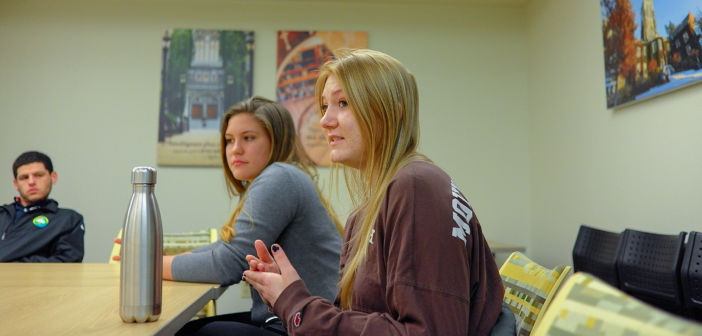Lehigh’s annual Hawks Against Hazing week promoted discussions about hazing and allowed students to propose prevention strategies.
Kallyse Duddlesten, ’17, vice president judicial of the Panhellenic Council, coordinated events for the week and planned how each event would gain student participation and garner support against hazing.
This year Panhel increased its involvement in hazing prevention. The members of Panhel realize Lehigh looks to them to solve issues of hazing, Duddlesten said in an email.
“While we can’t stamp it out in a day, we hope that every year we can get better and be better for the community,” Duddlesten wrote.
On Monday, the week began with a social media blast designed to get the word out to the Lehigh community about upcoming events.
Tuesday was the biggest event of the week, where Panhel hosted a hazing workshop that over 75 students attended and Duddlesten facilitated.
Kensley Lipka, ’19, a new member of Pi Beta Phi, said the workshop fostered discussion around hazing and hazing prevention. She said many students openly shared their opinions in a safe space.
“It brought everyone together to discuss what’s been happening in light of recent events, especially about emails and rumors,” Lipka said.
These recent events — including the submission of nine anonymous hazing reports to the Lehigh University Police Department — lead to an increase in police presence this semester.
Margaret Burnett, the president of Panhel, said the workshop also encouraged sorority members to promote sisterhood within their chapters.
Approximately two to three women from each chapter participated in the workshop, and Panhel invited members of the Interfraternity Council to participate as well. Although the workshop was successful in bringing people in the Greek community together, the attendance rate of non-Greek students was low.
“I would have liked to see people outside of Greek life involved,” Burnett said. “Hazing isn’t unique to Greek life, it happens in other forms. Any time you get a group of people together, there’s potential of hazing to occur.”
Alexandra Gonzalez, ’19, thought about participating in sorority recruitment but decided against it. Although she is not affiliated with a Greek chapter, she thinks hazing is an important issue to recognize. However, its not an issue she’s confronted with on a regular basis.
“It’s important to state that hazing isn’t right in general, but it’s more difficult for non-Greeks to do that because it’s harder for them to understand hazing,” Gonzalez said. “Some people may think non-Greek opinions aren’t as important because they haven’t experienced any form of hazing.”
Gonzalez said that while hazing wasn’t a determining factor in her choosing to rush or not, it’s something that happens at Lehigh “under the table.”
On Wednesday, Panhel encouraged each sorority to host a sisterhood bonding event and post pictures on social media. These sisterhood bonding events are done a few times a month but were encouraged more this week, Burnett said.
To conclude the week, on Thursday or Friday, each sorority performed acts of kindness for its new members, such as delivering baked goods to their dorms.
“We realize that Greek life can feed a hazing culture, but we hope that by doing these things and talking about the problem, we can change that for Lehigh’s campus,” Duddlesten wrote.
Burnett said the issue of hazing is always on Panhel’s agenda.
“I just want people to know how seriously we take hazing, these are things we work on all the time and we really think of different prevention strategies,” Burnett said. “We’re all about self-improvement and we’re working every year to get better and better.”
In light of recent events involving the conduct of Greek chapters, Duddlesten wrote she’s happy Panhel is spreading a message about the problems hazing can cause.
“It’s imperative that we take a stand and start realizing the effect our behavior has,” Duddlesten wrote.






Comment policy
Comments posted to The Brown and White website are reviewed by a moderator before being approved. Incendiary speech or harassing language, including comments targeted at individuals, may be deemed unacceptable and not published. Spam and other soliciting will also be declined.
The Brown and White also reserves the right to not publish entirely anonymous comments.